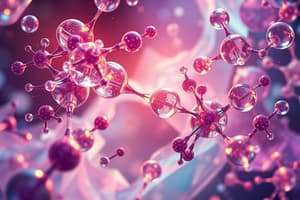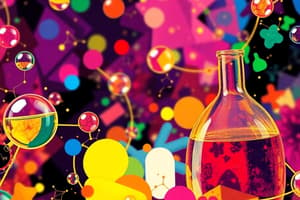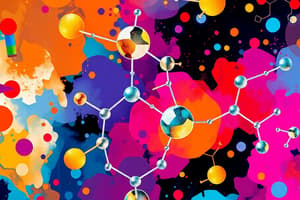Podcast
Questions and Answers
Can you define a drug?
Can you define a drug?
A drug is a substance used to diagnose, cure, treat, or prevent disease.
What do you think is the most important drug (or drug class)? Why?
What do you think is the most important drug (or drug class)? Why?
Personal opinions may vary, but many consider penicillin important due to its effectiveness in treating bacterial infections.
What is the difference between pharmaceutical drugs and drugs of abuse?
What is the difference between pharmaceutical drugs and drugs of abuse?
Pharmaceutical drugs are used for therapeutic purposes, while drugs of abuse are used recreationally for their psychoactive effects.
The first synthetic drug, chloral hydrate, was discovered in 1896.
The first synthetic drug, chloral hydrate, was discovered in 1896.
What class of compounds, known for their biological activity, were among the first to be isolated from plants?
What class of compounds, known for their biological activity, were among the first to be isolated from plants?
What was chloroform primarily employed as?
What was chloroform primarily employed as?
Which company was one of the first to show an interest in pharmaceuticals?
Which company was one of the first to show an interest in pharmaceuticals?
What was the first synthetic antipyretic drug marketed?
What was the first synthetic antipyretic drug marketed?
Who first isolated morphine in its pure form?
Who first isolated morphine in its pure form?
Flashcards are hidden until you start studying
Study Notes
Overview of Lectures
- History of the pharmaceutical industry and the origins of medicinal drugs
- Drug discovery and development process essential for new medications
- In-depth exploration of drug targets with specific examples
- Characteristics of effective drugs, including pKa, stereochemistry, lipophilicity, hydrogen bonding, and electronegativity
- Lead compound synthesis in industry: including chemistry, purification, and analysis
- Importance of drug metabolism in pharmacology
Learning Outcomes
- Comprehend key drug targets and their relevance
- Predict drug properties influencing biological activity
- Identify functional groups and foresee their interactions with drug targets
- Mastery of molecular drawing as a fundamental chemist skill
- Interactive problem-solving and structure drawing integrated into learning
Early Pharmaceuticals
- First medicinal drugs derived from natural sources: herbs, plants, roots, and fungi
- Natural compounds often contain secondary metabolites serving as biological toxins
- Chloral hydrate, discovered in 1896, became the first synthetic drug introduced as a sedative-hypnotic
- Initial pharmaceutical companies emerged from textile and synthetic dye industries
Key Historical Discoveries
- Morphine isolation by Friedrich Willhelm Sertüner in the early 1800s regarded as a pivotal moment in modern medicine
- This isolation made it possible to extract, purify, and measure drug doses effectively
- Alkaloids, including morphine and quinine, represent early bioactive compounds extracted from plants with significant therapeutic effects
Notable Synthetic Drugs
- Chloroform, an early synthetic drug, used as an anesthetic for pain relief, particularly during childbirth
- The pharmaceutical industry's roots trace back to the production of textiles and dye
- Friedrich Bayer Company was a pioneer in pharmaceuticals, utilizing coal tar for aromatic compounds
- Acetanilide, marketed as Antifebrin® in 1886, was the first synthetic antipyretic drug, leading to further drug discovery from waste products like p-nitrophenol
Studying That Suits You
Use AI to generate personalized quizzes and flashcards to suit your learning preferences.




